Gout is a chronic disease of monosodium urate deposition characterized by arthritis flares and disability. Lasting days to weeks if untreated, flares are inflammatory, often intensely painful, and debilitating. Separated by asymptomatic intercritical periods, flares can increase in frequency and severity over time. Advanced disease develops in approximately 15% of patients1 and is characterized by subcutaneous nodules composed of monosodium urate… Read more »
News & Notes
Treatment of Hypertension
Hypertension, a major risk factor for cardiovascular morbidity and mortality, is defined by the 2017 American College of Cardiology (ACC)/American Heart Association (AHA) guideline as systolic blood pressure (SBP) at least 130mmHg or diastolicBP(DBP) at least80mmHg, or reported treatment with antihypertensive medication.1,2 The prevalence of hypertension in US adults is approximately 44%to 49%.3,4 Based on self-reported data from a survey of hypertension… Read more »
Diagnosis and Management of Hereditary Hemochromatosis
Hereditary hemochromatosis(HH)is a heterogeneous genetic disorder that results in unregulated and excessive intestinal iron absorption leading to overabundance of iron deposition in tissue. HH is most common in people of northern European ancestry, for whom the prevalence is 1 case per 300 people.1-3. Click to read more from Elizabeth Cabrera, MD; Gonzalo Crespo, MD; Lisa B. VanWagner, MD, MSc
Promising early results for a novel antibody-drug conjugate in metastatic triple-negative breast cancer
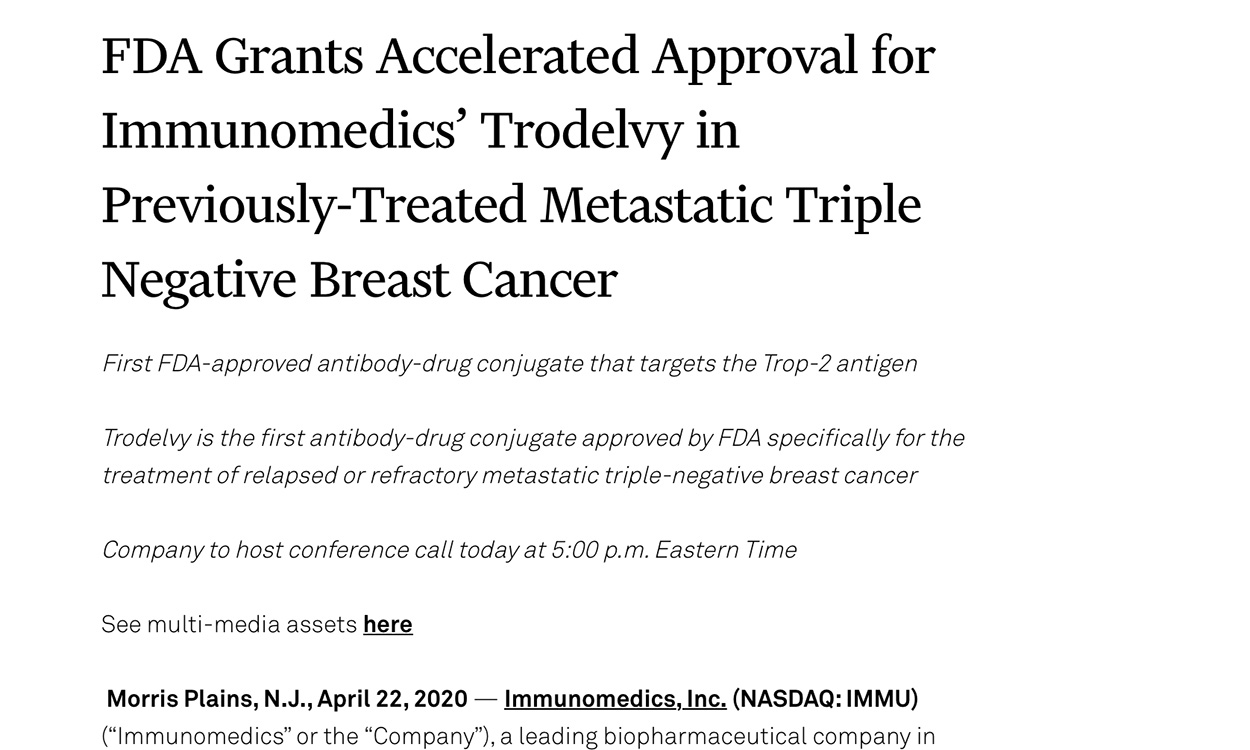
Triple negative breast cancer is the most aggressive type of breast cancer and most difficult to treat because it is not dependent on hormones or targeted Her2 proteins for growth that we can target with meds. These tumors will often become resistant to chemotherapy within a few treatments. A new drug called Sacituzumab govitecan-hziy… Read more »
New treatment to improve anemia associated with sickle cell disease

In our hematology-oncology clinic, we treat many patients with chronic pain and anemia from sickle cell disease. The abnormalities in the red cells of patients with sickle cell disease causes hemoglobin to deoxygenate and polymerize, leading to red cell destruction. Voxelotor is a inhibitor of the hemoglobin S polymerization. Once daily oral dosing of voxelotor was shown … Read more »
FDA approves avapritinib in PDGFRA-mutated gastrointestinal tumors

In January 2020, the FDA approbed avaprintinib for the treatment of metastatic gastrointestinal stromal tumors (GIST). This drug is approved for GIST tumors that harbor a specific mutation in FDGFRA gene. This gene mutation usually indicates a very resistant tumor to normal medications. Trials have shown a high response rate with almost 85% seeing tumor… Read more »
FDA approves olaparib for patients with BRCA-mutated metastatic pancreatic cancer
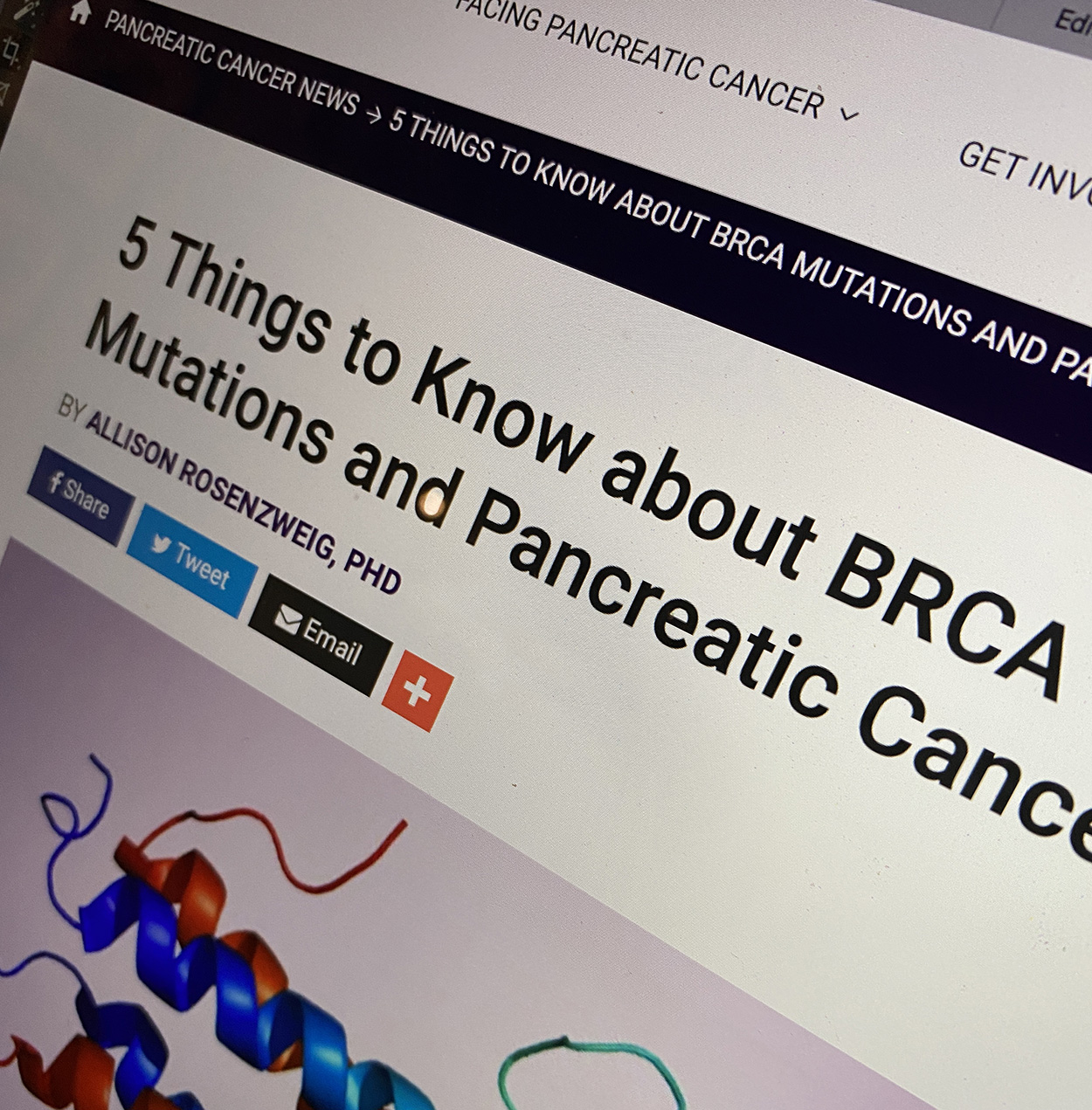
In December 2019, the FDA approved olaparib as a treatment with germline BRCA-mutated metastatic pancreatic cancer after successful treatment with chemotherapy. BRCA mutations are associated with higher risk of developing breast and ovarian cancer, as well as prostate cancer and pancreatic cancer. Olaparib has already been approved in breast and ovarian cancer. In the POLO… Read more »
Dietary supplements—Vitamin D and omega-3 fatty acids—do not have an affect on cancer prevention

The use of dietary supplements in the United States is very common. In the past decade, the number of people taking Vitamin D has increased 400% and omega-3 fatty acids 1000%. These products have been thought to possibly protect against heart disease and cancer. However, in two large randomized trials where patients either took the… Read more »
Chemoimmunotherapy also approved for metastatic squamous lung cancer
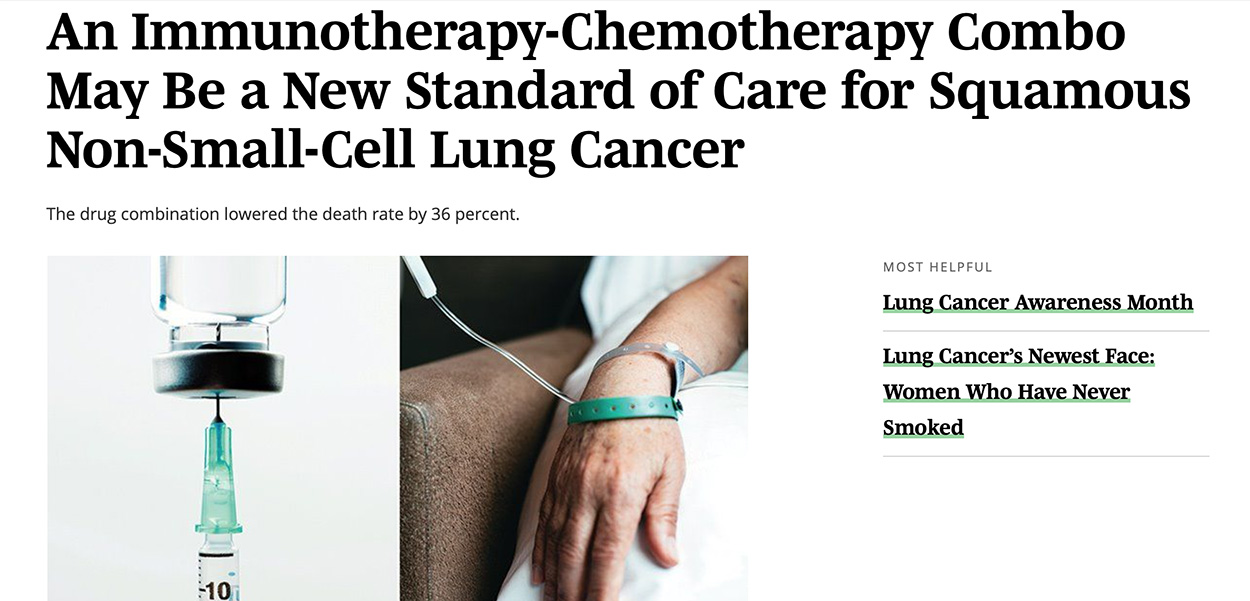
Chemotherapy in combination with immunotherapy has already been used for patients with metastatic lung adenocarcinoma for over a year. A second type of non-small cell lung cancer, called squamous lung cancer, just had a similar approval for benefit of immunotherapy in combination with chemotherapy compared to chemo by itself. In the KEYNOTE-407 trial, patients with… Read more »
Kadcyla shown to benefit some patients with Her-2 positive breast cancer after surgery

Her-2 positive breast cancers depend on the growth protein Her2 for continued cancer growth. We have a few different treatments that can “turn off” this Her-2 growth protein. Frequently, we will use a combination of chemotherapy and Her-2 targeted medicine prior to surgery in Her-2 positive breast cancer patients. The goal is to get rid… Read more »
Combination immunotherapy in metastatic non-small cell lung cancer
Currently the standard of care for new metastatic lung cancer is to combine chemotherapy with immunotherapy. Some people are not great candidates for chemotherapy, however. A new study shows that in non-small cell lung cancer patients, combining two immunotherapy medications together (nivolumab + ipilumimab) has a survival advantage over immunotherapy or chemotherapy alone. The side… Read more »
First immunotherapy and chemotherapy combination approved in metastatic triple negative breast cancer

We use immunotherapy in many other cancer types to help increase the immune system’s ability to identify and attack cancer cells. For years, we have not been able to find a way that immunotherapy would benefit women with breast cancer. In a recent trial, women with untreated metastatic breast cancer were randomized to receive chemotherapy,… Read more »
New treatment alternative in bladder cancer approved
Many bladder cancers that are resistant to chemotherapy and immunotherapy have mutations in the gene encoding a growth protein called fibroblast growth factor receptor (FGFR). Erdafitinib is a inhibitor of this FGFR growth protein and was studied in metastatic bladder cancer with FGFR mutations. In a trial of patients with these mutations, about 40% had… Read more »
New cancer treatment approved for patients with specifically mutated NTRK-mutated solid tumors
In November 2018, larotrectinib was approved by the FDA for treatment of patients with solid tumors that have a neurotrophic receptor tyrosine kinase (NTRK) gene fusion. NTRK gene fusions are most commonly seen in salivary gland tumors, soft tissue sarcoma and thyroid cancer. Larotrectinib is an oral medicine that inhibits proteins encoded by the NTRK… Read more »
Eye-catching nutrition headlines not as clear as they seem

By David J. Mooney, M.D. There were two nutrition/lifestyle based studies in the past week which made national headlines, but the eye-catching headlines did not match up with the data from the trials. It seems like these headlines pop up each month. Fill in the blank associated with cancer risk/mortality/immortality! I (Dr. Mooney) wanted to look… Read more »
The Khaleel K. Ashraf, M.D. BLOG: An inflection point in history
Update on Cancer Immunotherapy and Immuno Oncology The past several years have been a particularly optimistic period for immuno-oncology. The first approval of modern cancer immunotherapy was interferon-alpha in 1986 for hairy cell leukemia, and later for chronic myelogenous leukemia, follicular non-Hodgkin lymphoma, melanoma, and AIDS-related Kaposi’s sarcoma (1) Several other agents have been approved… Read more »
Cancer prevention – 10 basic facts
1) In over 60 percent of the time cancer happens due to purely random chance. There is no way to prevent this. And the longer one lives, the longer the chance of such random events, the main reason why cancers are more common as we get older. As we get older, cells had a longer… Read more »
Duloxetine may be able to help with hormone-therapy associated joint pains in breast cancer patients
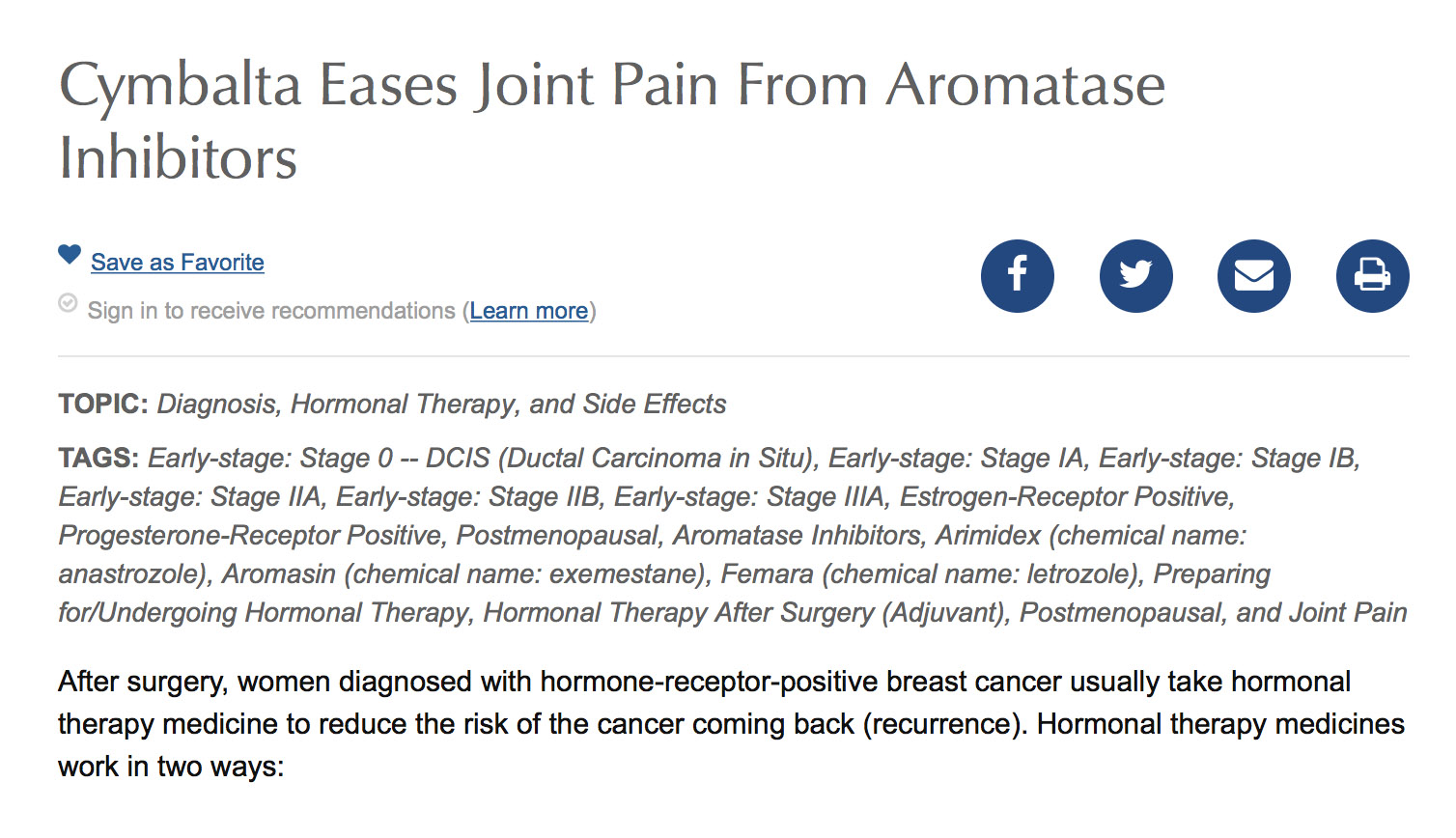
Aromatase inhibitors (hormone therapy) are used commonly in estrogen or progesterone-depending breast cancer to help prevent recurrence. They are very effective medicines and often help us avoid chemotherapy. Unfortunately they do have some significant side effects, including hot flashes, vaginal dryness, osteoporosis and joint pains. About half of patients develop some joint pain and stiffness, and… Read more »
Colorectal Cancer Awareness

Colon cancer screening with colonoscopies or occult blood stool tests is one of the most effective screening tools we have to detect early stage colon cancer. Colon cancer usually evolves over many years from abnormal cells that initially form a “polyp” in the colon before they start becoming more aggressive and invading into the colon… Read more »
New immunotherapy option for unresectable locally advanced lung cancer

The FDA recently approved an immunotherapy treatment, durvalumab, against programmed death ligand 1 (PD-L1) for locally advanced (unresectable) non-small cell lung cancer after treatment with chemotherapy and radiation. The PACIFIC trial was recently published that looked at durvalumab as a consolidation therapy in patients with stage III NSCLC who did not have disease progression after… Read more »
New advances in adjuvant treatment of high risk melanoma after surgical resection

Two new studies published last month showed exciting new advances in the treatment of melanoma. We know that patients who have a local melanoma resected with lymph node involvement have a very high risk of relapse (over 50%) without any further treatment. These two studies looked at adding systemic therapy—either targeted therapy or immunotherapy—to see if… Read more »
The Khaleel K. Ashraf, M.D. BLOG: Spontaneous Regression of Cancer
Cancer is one of the scariest words in the English language and when we are afraid we tend to become irrational – even otherwise intelligent people. That is why there are more quackery around cancer treatments than any other disease. Cancer is likely second only to death itself in terms of stuff that frighten people.… Read more »
FDA approves niraparib for treatment of recurrent ovarian cancer
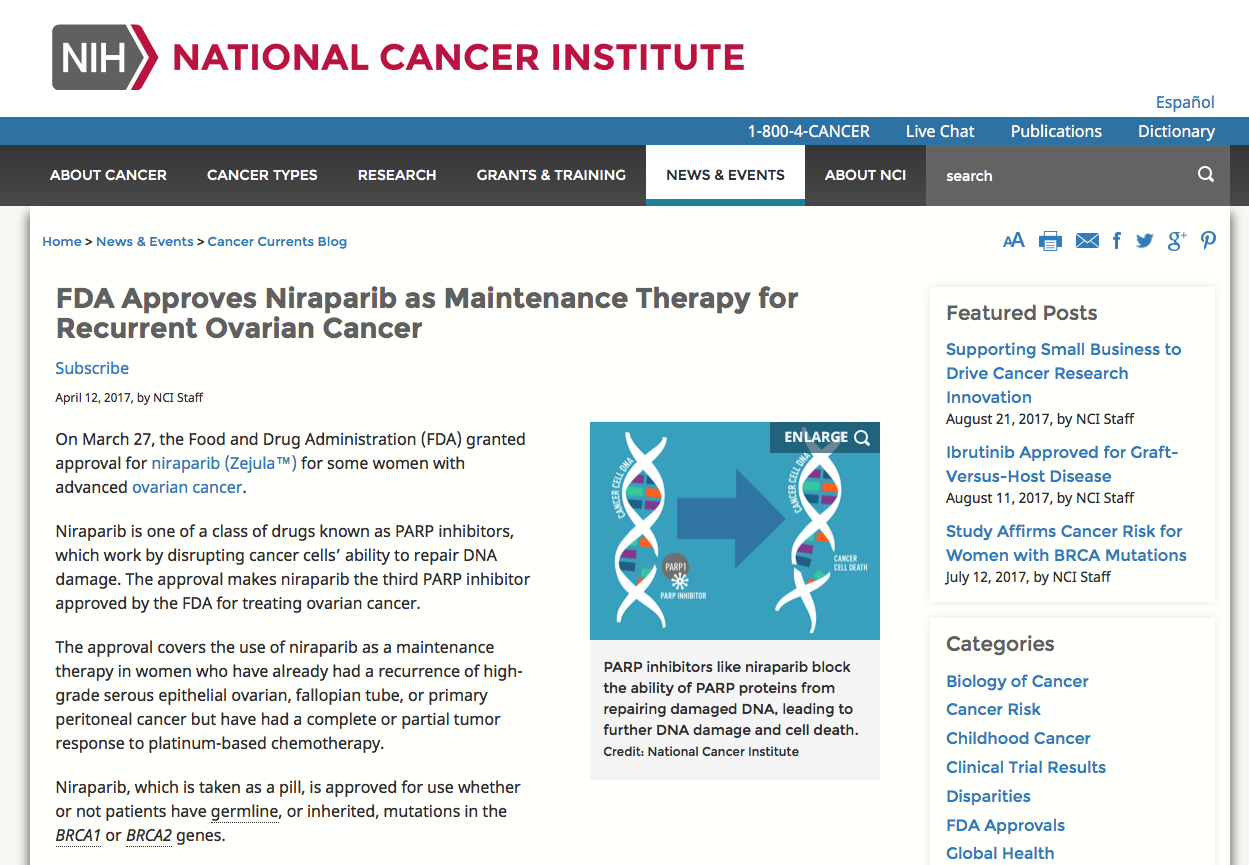
Ovarian cancer is one of the more lethal cancers that women can develop. It is often associated with either inherent mutations in a woman’s own DNA, or mutations that develop within an ovarian cancer, that impairs the ability of your body to repair DNA breaks. PARP (poly ADP-ribose polymerase) inhibitors are oral medications that further… Read more »
A healthy lifestyle after colon cancer treatment is associated with better outcomes
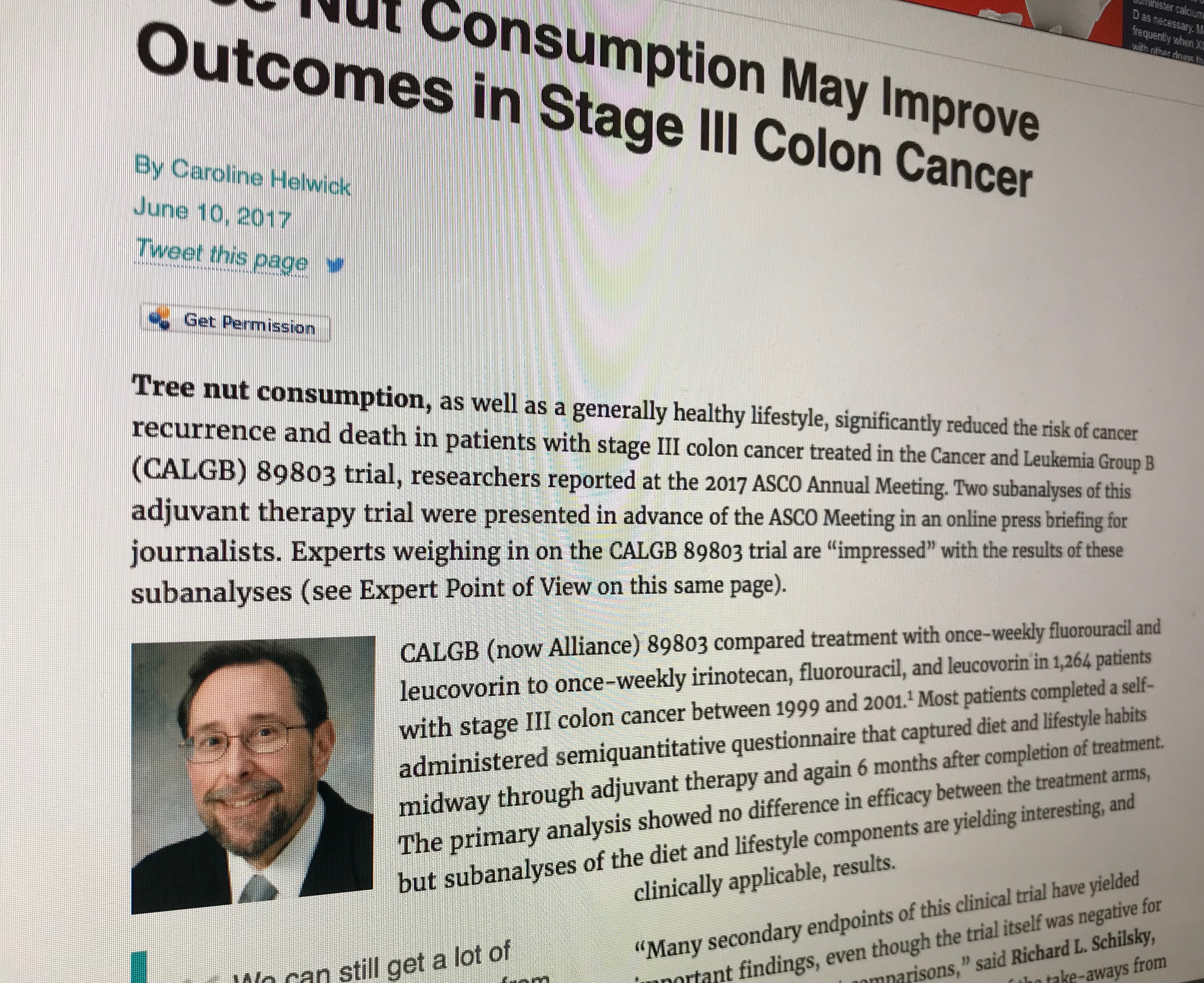
Recently, scientists went back to analyze how patients’ diets and activity levels while undergoing chemotherapy may affect their outcome in related to colon cancer recurrence. This data was based off of surveys that the patient’s completed while undergoing trials for chemotherapy options of stage III colon cancer. In these post-trial analyses, they found that patients… Read more »
In aggressive primary brain tumors (glioblastoma), new treatment method prolongs survival

At the 2017 American Association for Cancer Research meeting earlier this year, final trial results of a new approach to treat brain tumors was published. This new approach delivers low-intensity electric fields (tumor treating fields) to the brain through a cap that a patient wears throughout the day. A randomized trial comparing standard chemotherapy to… Read more »
FDA approves first chemotherapy and immunotherapy combination for non-small cell lung cancer

The FDA recently granted accelerated approval for pembrolizumab in combination with pemetrexed and carboplatin for the treatment of patients with previously untreated metastatic non-small cell lung cancer (non-squamous). This is the first approval to combine immunotherapy with chemotherapy in lung cancer. The trial compared standard chemotherapy to pembrolizumab along with standard chemotherapy in patients that… Read more »
FDA approves immunotherapy for first molecular indication irregardless of tumor type
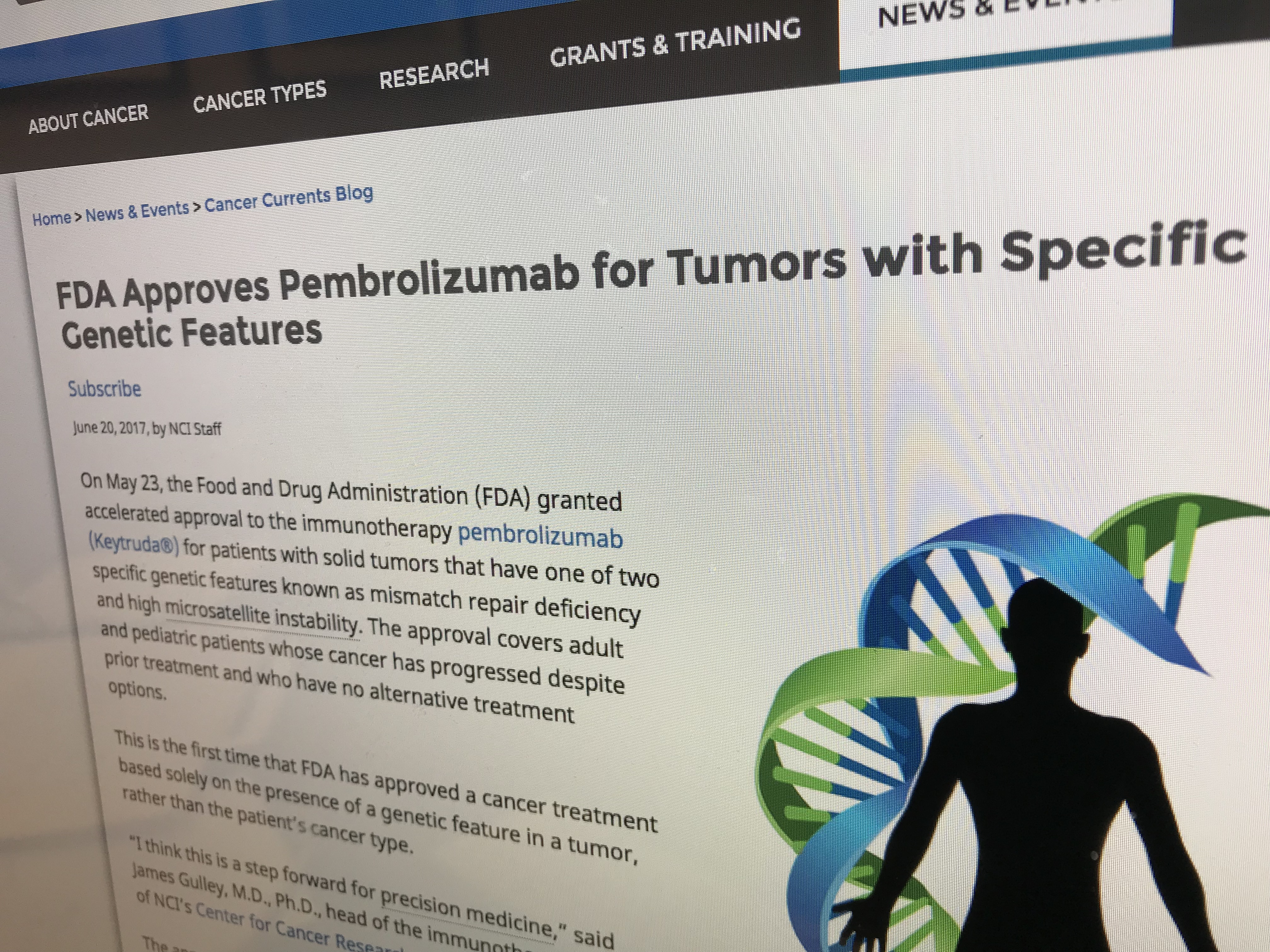
In May, the FDA approved pembrolizumab in any unresectable or metastatic tumor with mismatch repair deficiency or microsatellite instability. These are terms to describe mutations found in some tumors that prevent your body’s cells from repairing errors in DNA copy. This leads to instability and tumor growth. The most common tumor types where we find… Read more »
Less chemotherapy after colon cancer surgery may be just as effective in some patients
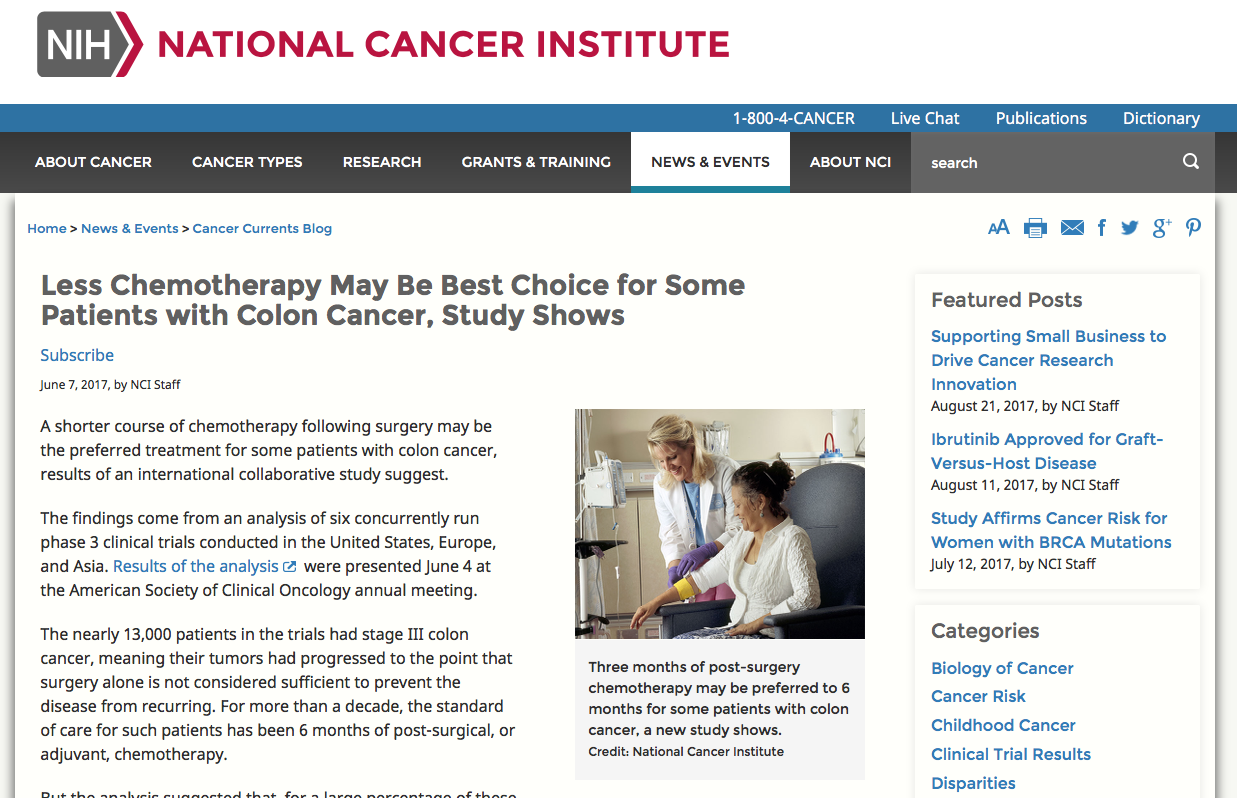
Recently, results of the International Duration Evaluation of Adjuvant Chemotherapy (IDEA) trial were published. This study compared the efficacy of two different durations of chemotherapy after resection of stage III colon cancer: 3 months vs 6 months of chemotherapy with standard chemotherapy drugs, 5FU and oxaliplatin. The study showed only a very small benefit in… Read more »
Recent study shows chemotherapy after biliary tract cancer resection significantly improves how long patients live

Galbladder and biliary tract cancer (your biliary tract connects your liver and galbadder to your pancreas and intestine and helps in food digestion) are rare types of cancer, sometimes associated with underlying liver disease. It is usually a very aggressive tumor and difficult to cure, even with surgery. In the past, there have been no… Read more »
Adding abiraterone to standard hormone therapy improves survival in advanced prostate cancer

Previously, treatment for new metastatic prostate cancer had been to treat with hormone therapy (androgen deprivation therapy to deplete testosterone levels) with possibly adding chemotherapy for higher risk patients. A recent study called the LATITUDE study showed that patients who received androgen deprivation therapy along with a drug called abitaterone acetate (a pill that further… Read more »
HOAA Helpful Facts: Diet, nutrition and cancer

Nutritional myths: This is an interesting podcast with written script of discussion as well. This is a discussion by two nutritionists affiliated with cancer centers. They discuss some basic aspects of nutrition and cancer as well as some myths that are commonly heard about diet relating to cancer, including what foods to eat to avoid… Read more »
HOAA Cancer Update: Bladder cancer
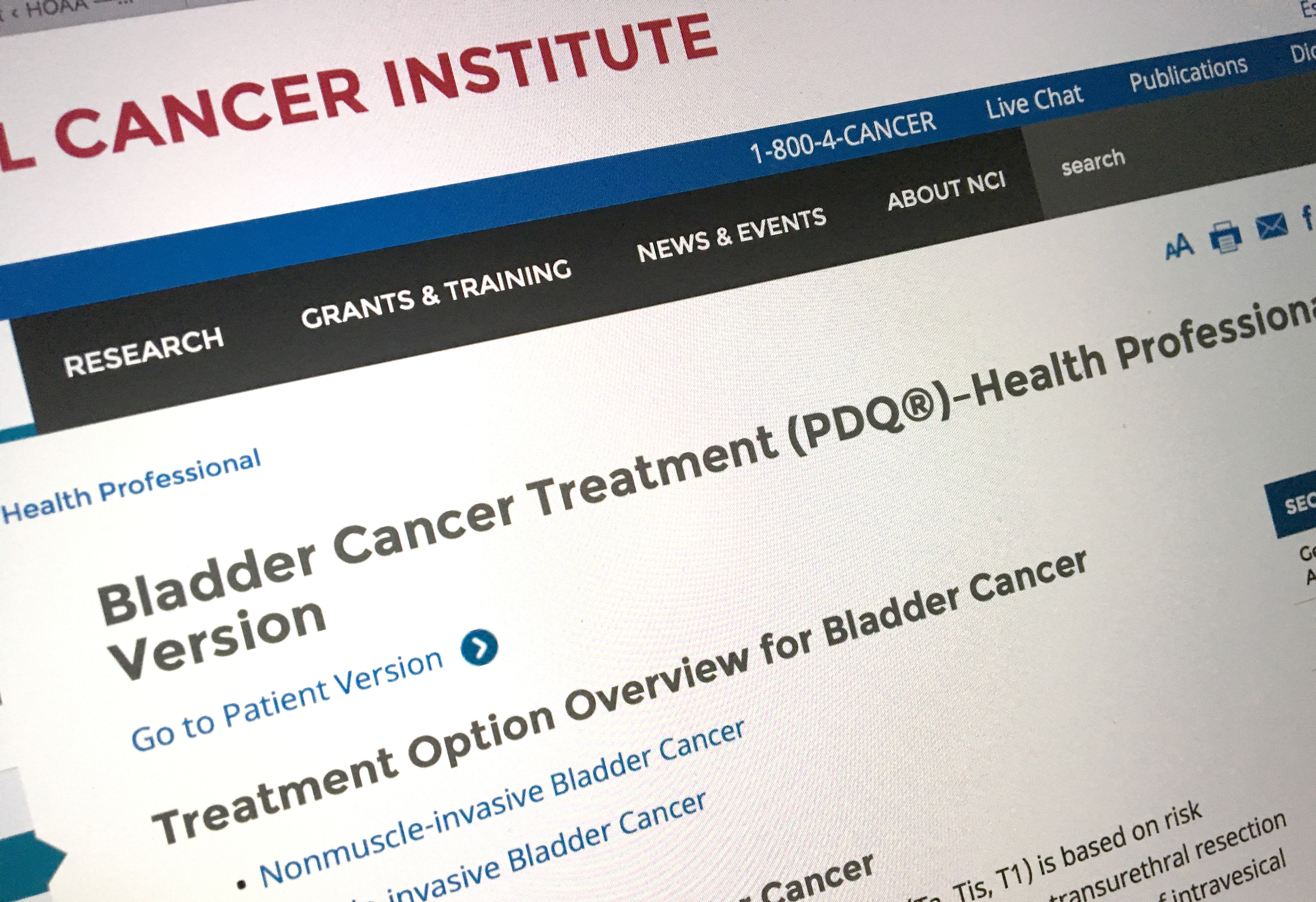
Bladder cancer is a disease that often requires oncologists to work alongside urologists to achieve the best outcomes. The standard treatment for bladder cancer or urothelial cancer for many years was radical surgery by itself. Recent data have shown that chemotherapy works well to help shrink the tumor and increase the chance of cure with… Read more »
Genetic and family history evaluation important in cancer evaluation and screening

Additional genes found that are linked to cancer. A family history should be a part of any initial work-up of cancer, as well as helping primary care physicians determine cancer risk in their patients. While we used to only know a few genes that were definitively linked to increased cancer risk, there are now many… Read more »
Immunotherapy continues to help improve cancer treatment in certain patients

Immunotherapy 2.0 named clinical advance of the year in cancer care. A lot of our updates are about new indications for immunotherapy to treat many types of cancer. This past year, new indications were approved for treatment in melanoma, bladder cancer, head and neck cancer, lung cancer and kidney cancer. While immunotherapy does not work… Read more »
2 new FDA indications March 2017
The FDA approved one new drug and gave a new indication for a previously approved drug in March 2017. The FDA approved a new drug, called ribociclib for use in metastatic hormone-positive breast cancer. Ribociclib is a pill that inhibits CDK 4/6 similar to a previously approved drug, palbociclib, that we wrote about previously. https://www.hoaallc.com/palbociclib-and-hormonal-therapy-has-proven-progression-free-survival-benefit/… Read more »
Cancer fatigue is common symptom and quality of life issue in cancer patients

Cancer-related fatigue: Fatigue is a symptom that we see commonly in our cancer patients. Cancer itself can cause fatigue and fatigue is also a side effect of almost all cancer-related treatments or other medicines that may be prescribed. While there is not an easy fix to fatigue, it can be a life-altering side effect that… Read more »
Monitoring for cardiac dysfunction in cancer survivors

Certain cancer treatments, such as particular chemotherapy drugs (doxorubicin, trastuzumab) or radiation to the chest or breast tissue, can increase risk of patients developing cardiac dysfunction—either during treatment or later after treatment has completed. Patients at risk of developing heart complications from cancer treatment often need close communications between your oncologist, your primary care provider… Read more »
Immunotherapy treatment with ipilumimab for high-risk melanoma
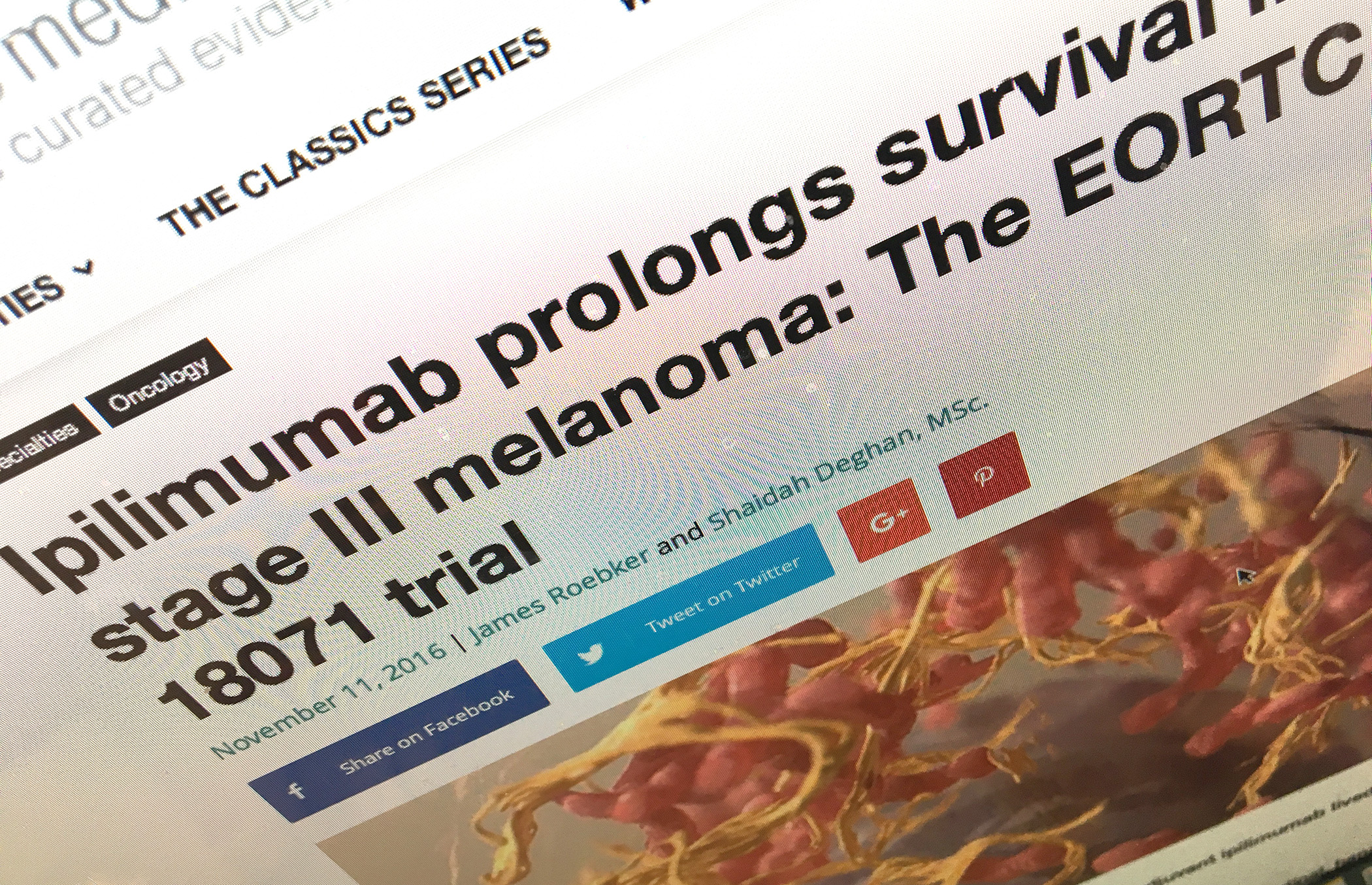
Immunotherapy treatment with ipilumimab after resection of high-risk melanoma improves overall survival compared to no treatment. In high risk melanoma lesions where a cutaneous melanoma has spread to local lymph nodes, despite surgical resection, only about 45% of patients will not have the melanoma come back within 4 years. Currently, there are no great medical… Read more »
Palbociclib and hormonal therapy has proven progression-free survival benefit

In hormone-positive metastatic breast cancer, combination therapy with palbociclib and hormonal therapy has proven progression-free survival benefit Palbociclib is an oral drug that inhibits cell cycle growth by blocking cells from initiating initial switch to the growth cycle of cells though CDK4 (Cyclin D-Dependent Kinase) and CDK 6 inhibition. This drug has been found to… Read more »
Immunotherapy now approved as front-line treatment for certain subset of patients with non-small cell lung cancer

The KEYNOTE-024 trial was recently published that will be a game-changer for the first-line treatment of metastatic non-small cell lung cancer. In a certain subset of patients with PD-L1 expression over 50% (PD-L1 is a marker of immune activity within the tumor), patients were randomized to receive either standard chemotherapy or pembrolizumab (an immune therapy… Read more »
“liquid biopsy” shown to accurately detect genetic mutations in lung cancer patients

In lung cancer patients, it is important to test for “targetable mutations” in the cancer tissue. Targetable mutations are specific DNA changes to cancer cells that cause specific proteins to signal cancer cells to grow. These are important to test for because we have medications that turn off these proteins that are more effective than… Read more »
New drug in small cell lung cancer still in early trials
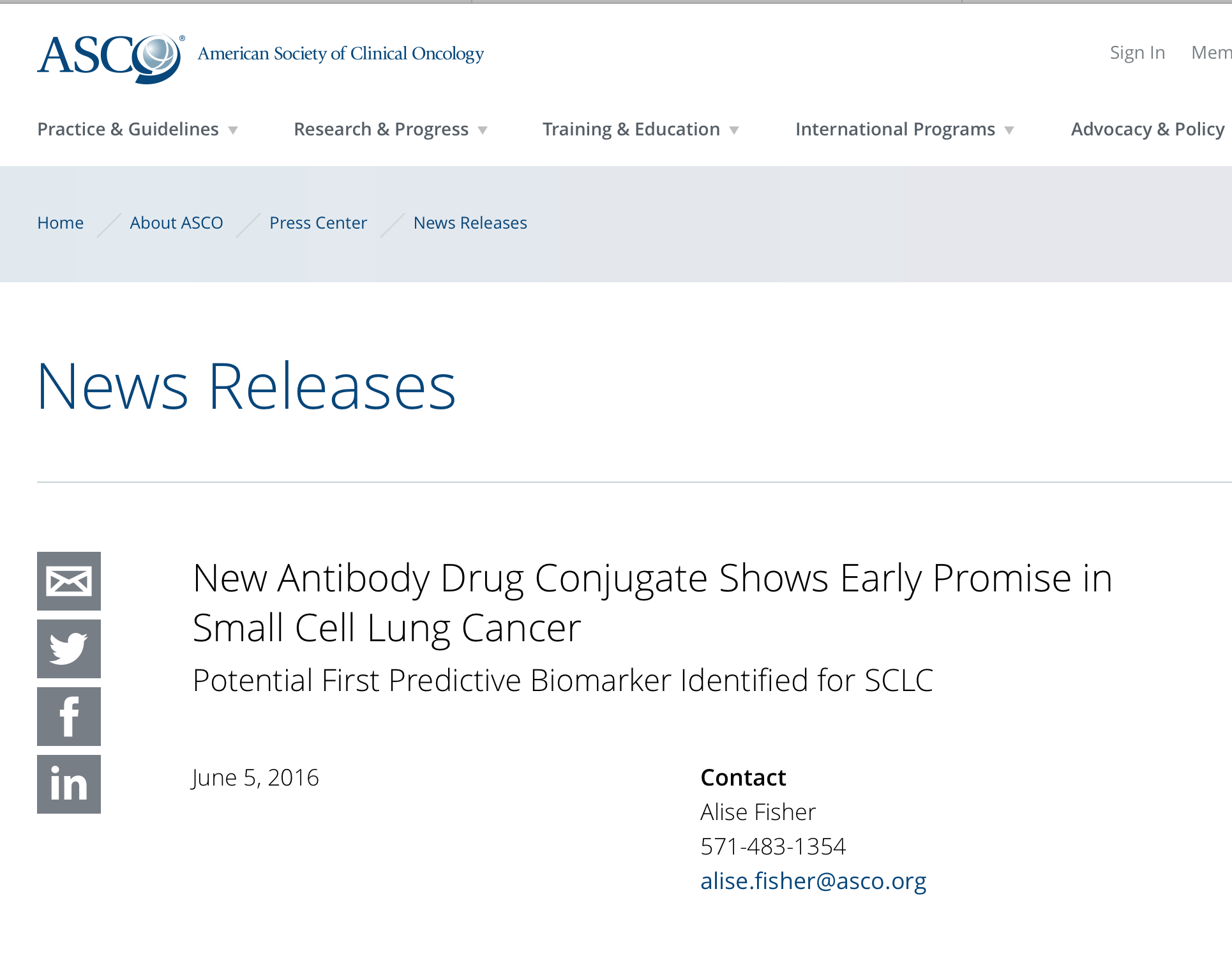
There was encouraging news from Chicago in June about a potential new drug to help treat small cell lung cancer, a cancer where unfortunately there have been no new drug developments in years. Prior research showed that a protein called delta-like protein 3 (DLL3) is very active in small cell tumors and not active in… Read more »
Continued progress in pancreatic cancer after resection
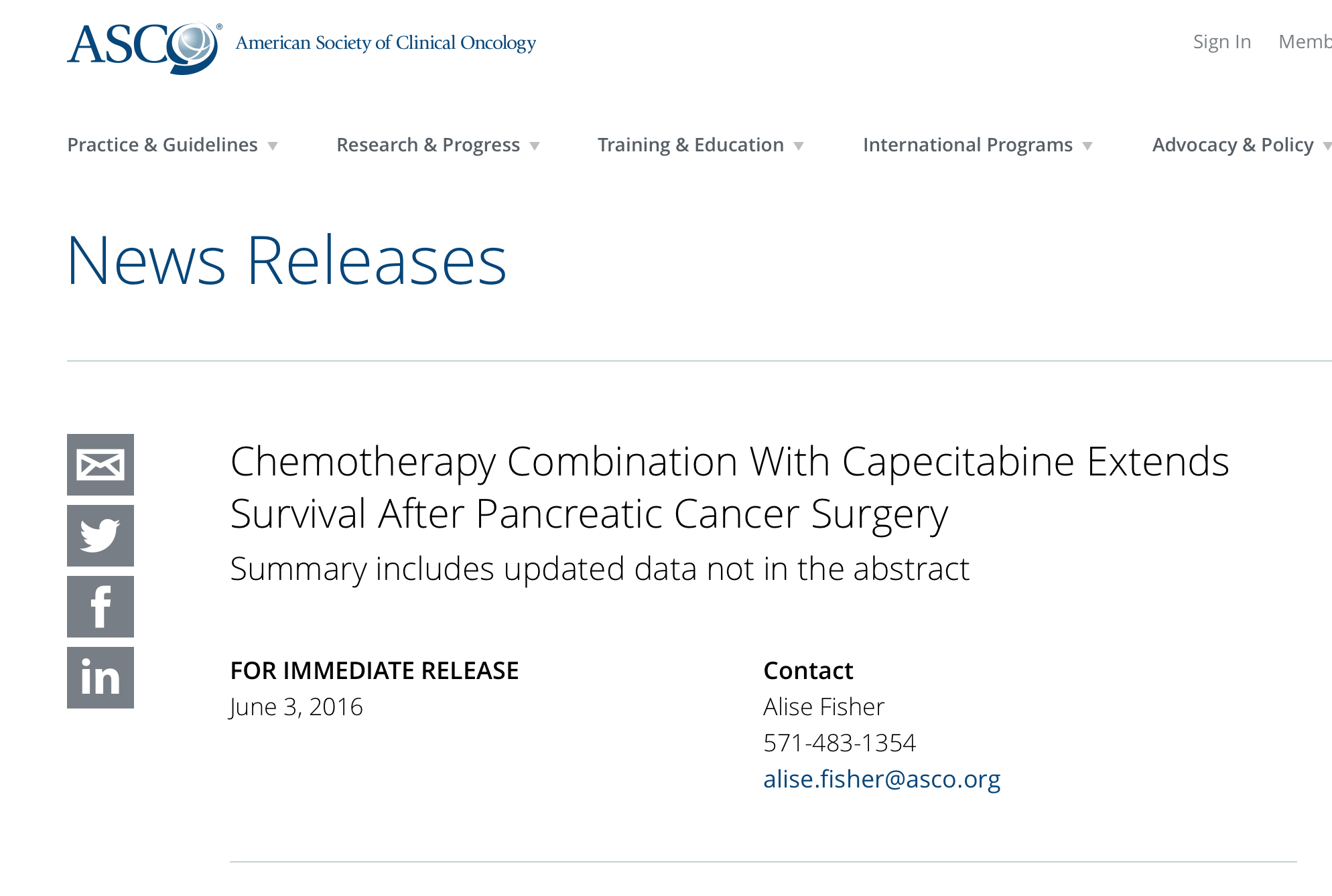
Pancreatic cancer has been a very difficult cancer to treat and cure. Unfortunately, most pancreatic tumors have already spread at time of diagnosis, but even those found early that can be resected have a high risk of coming back. Therefore, chemotherapy after surgery (called “adjuvant therapy”) is the standard of care to help prevent the… Read more »
Small benefit to extended hormonal treatment of breast cancer

This summer, we finally received trial results about an important clinical question: does extended aromatase inhibitor (“hormonal”) treatment of breast cancer from 5 years to 10 years affect long-term outcomes in breast cancer survivors? Post-menopausal patients with estrogen or protesterone positive breast cancer were randomized to receive either 5 years or 10 years of aromatase… Read more »
New drug for CLL approved (April 2016)
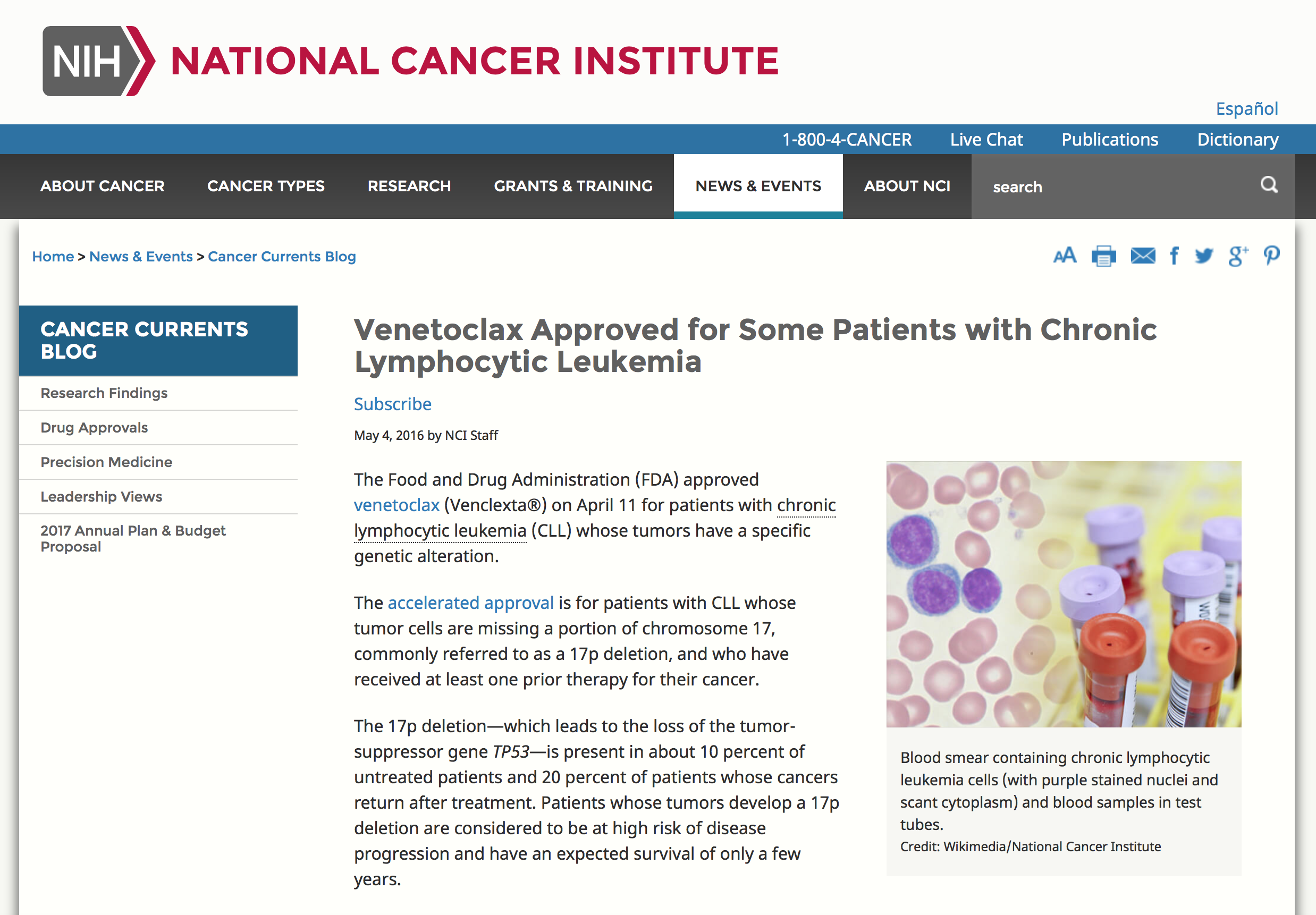
Venetoclax was recently approved for treatment of a specific subtype of aggressive chronic lymphocytic leukemia (CLL). The drug targets a particular protein in cancer cells, BCL2, which helps cancer cells avoid being killed and is overexpressed in CLL cells. It is an oral drug that has been shown to be very effective in CLL patients… Read more »
CMS Announces Hematology & Oncology Associates of Alabama (HOAA) Selected for an Initiative Promoting Better Cancer Care
Dr. Allen Yeilding and Dr. Elquis Castillo are pleased to announce that HOAA has been selected by the Centers for Medicare & Medicaid Services (CMS) as one of nearly 200 physician group practices and 17 health insurance companies to participate in a care delivery model that supports and encourages higher quality, more coordinated cancer care.… Read more »
Hematology and Oncology Associates of Alabama releases new expanded website

Hematology and Oncology Associates of Alabama releases new expanded website. The new website is responsive, meaning it is optimized for mobile devices as well as desktop viewing. The new site was designed with patient and prospective patients in mind and is consistent with the HOAA mission of providing our patients with compassionate, comprehensive, and personalized care… Read more »
Full time phone triage system can lead to improved patient outcomes
Recent research by oncology groups has shown that clinics with a full time phone triage system have a decreased hospitalization rate and ER utilization rate as well as improved patient outcomes. At HOAA, we take pride in having a great triage system that we have had for years. We have two full time triage nurses… Read more »
Immunotherapy named as the “Advance of the year”
The American Society of Clinical Oncology named immunotherapy as the “Advance of the year”. There were many exciting developments, as you can see from some of our previous posts. There have also been exciting trials with immune therapy in bladder cancer, Hodgkin disease, liver cancer and head and neck cancer. These are especially exciting because… Read more »
FDA has now expanded indications for immunotherapy treatments of cancer
Immune therapy treatments first were approved for treatment of melanoma. In fact, the FDA recently approved combination of two immunotherapy drugs as initial treatment of melanoma. Recently, these same immune therapies have been approved for other cancers in the “second line setting, ” which means that initial chemotherapy is not working any longer. First, immune… Read more »
Two New Monoclonal Antibody Treatments for Multiple Myeloma (MM)
Monoclonal antibodies designed against cell surface proteins such as CD20 (rituximab) or HER2 (trastuzumab), cytokines such as VEGF (bevacizumab), and now immune checkpoints such as PD1 (e.g., pembrolizumab) have transformed oncology care and are routinely used across nearly all tumor types. Although treatment options for multiple myeloma (MM) over the last decade have converted the… Read more »
A new oral chemotherapy drug for colon cancer was approved by the FDA
A new oral chemotherapy drug for colon cancer was approved by the FDA on Sept 22, 2015. The drug is trifluridine/tipiracil, which targets altering DNA replication during cell division. The drug was tested and approved in patients with previously treated metastatic colon cancer that have progressed on all other approved treatments. The drug was compared… Read more »
Smoking has been associated clearly with increased rates of cancer.
Smoking has been associated clearly with increased rates of cancer, specifically lung cancer, esophageal cancer and bladder cancer, among others. Not only does smoking cause cancer, though, but research shows that smoking after a cancer diagnosis affects how well a patient tolerates cancer treatments, including surgery and chemotherapy. Attached is an article about new research… Read more »
Colon cancer and “mismatch repair deficiency”
Colon cancer is often driven by underlying defects in DNA repair during cell division called “mismatch repair deficiency”. This is a test that is easily looked at on tumor tissue and found in about 15-20% of colon cancers. These defects in DNA repair lead to increased rates of DNA mutation in cancer cells that significantly… Read more »
Trastuzumab is one of the first “targeted cancer therapies”, specifically for breast cancer.
Some breast cancers are dependant on a specific cellular protein called “Her2” that turns on uncontrolled cell division. Trastuzumab is a targeted therapy that specifically turns off Her2 protein function. It revolutionized “Her2 + breast cancer” with significant improvement in survival and cure rates. It is so effective that now, research is showing that we… Read more »
Dr. Mooney appears on Fox6
Dr. Mooney visited Fox 6 to discuss new Medicare recommendations for CT screening for lung cancer in heavy smokers aged 55-75. This has been shown in trials to catch lung cancer early before it has spread and improve survival among this demographic. We recommend anyone in this demographic discuss the risks and benefits of screening… Read more »
















